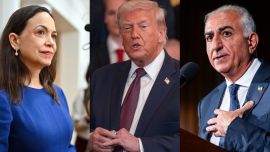One of the most persistent Argentine political clichés of this century is that Kirchnerism always shows a moderate face for election campaigns, only to practise the opposite of the preached once victorious, with the supreme example being the 2019 Fernández-Fernández presidential ticket where the tail subsequently wagged the dog. But some of this week’s developments bring into question whether the Frente de Todos government is presenting a moderate image in these midterms. It is true that recent days have seen the amiable reception of a senior Washington official while at the end of last month the government paid a fraction of Argentina’s Paris Club debt with every intention of doing the same with the much larger sums owed the International Monetary Fund – it is also true that very few La Cámpora militants rank high in the lists of parliamentary candidates (although many rank high enough to enter Congress) while such a firebrand as outgoing deputy Fernanda Vallejos (an extremist voice in the key area of economic policy) was dropped altogether. But various items in recent news indicate the opposite.
The surprise choice of Senator Jorge Taiana (current Vice-President Cristina Fernández de Kirchner’s senatorial running-mate in the 2017 midterms) as the new Defence minister may be considered almost the least of the recent lurches towards extremism. It was the hitherto invisible top candidate of the Frente de Todos lower house slate for key Buenos Aires Province, Victoria Tolosa Paz, who really set the ball rolling when she proclaimed on Tuesday that the government would be hitting big business and personal fortunes with heavier taxation in a Robin Hood spirit of robbing the rich to help the poor. This gratuitous announcement flew in the face of constant business complaints about a tax burden which has doubled this century to reach almost 30 percent of the economy with a considerably higher percentage for those who actually pay – this did not prevent the candidate (generally labelled as moderate by pundits until now) from accompanying this announcement with the extraordinary thesis that since investment fell off when the previous Mauricio Macri presidency lowered taxes (as it did indeed, in accurate anticipation of what was to follow), it stood to improve if taxation were increased. The La Plata politician was at pains to limit her intended victims to big business but the Italian model of economic giants often being confederations linking up chains of small firms also extends to Argentina (with its huge Italian ethnic component) – the scales of industry are not so neatly separable.
This might have gone down as a misguided outburst by a single politician out of sync with the coalition (something to which Vallejos was very prone) but the very next day new levels of aggressive state ambition were voiced by a member of the executive branch – Public Works Minister Gabriel Katopodis announced the virtual nationalisation of City access routes by pressing for their 2018 contracts to be scrapped. An attempt to head off the walkout the following day of deputy Facundo Moyano (apparently disenchanted by the absence of trade unionists in general and his own clan in particular among the lists of candidates), who had recently presented a bill to nationalise the access routes reserving seven percent of the proceeds to the toll employee union which he heads? Perhaps but the move falls into a wider nationalisation drive also including the crucial Hidrovía waterway (warmly pressed by Taiana). The accusations of extortionate tolls levied by Katopodis sound strange when the concessionaires have been allowed one single-digit increase since the start of 2019 with inflation heading towards 150 percent in that period but the minister based his charge on projections of the dollar equivalents in the 2018 contracts (which would be over 600 pesos today due to devaluation).
Last and probably least, the bizarre announcement of President Alberto Fernández last Monday that the Internet would be made a public service. Had he forgotten that he had already ordered that via Decree 690/2020 last August or was he seeking to show his determination to make it stick in the face of repeated court challenges by the operators?
Back in 1964 perhaps the furthest right presidential candidate the United States has produced, Republican Senator Barry Goldwater, gave as his campaign slogan: “Moderation in the pursuit of justice is no virtue.” Has our left-leaning government also decided that moderation in the pursuit of justice (whether understood under their pet synonym of lawfare or in a broader sense of correcting social injustices) is no virtue?


















Comments